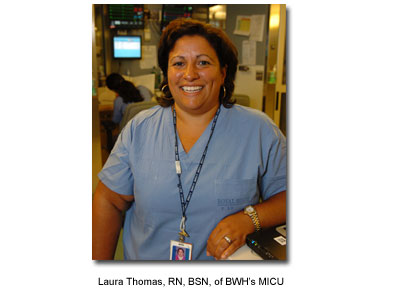Cultivating a Compassionate Connection

Seeing a loved one hooked up to unfamiliar equipment and surrounded by physicians in an intensive care unit can be a frightening and stressful experience for a family. Having a nurse who consistently communicates the plan of care for the patient can provide comfort to a family. Communication, not only with a family and patient, but also among the team of providers is instrumental to providing quality care.
Helping Care Team, Families Stay on Track
For seven of her 16 years at BWH, Laura Thomas, RN, BSN, has worked in the Medical Intensive Care Unit (MICU) where she finds clear communication correlates directly to quality of care. “One of the reasons we provide such great care on this unit is that we communicate so well with each other, with other teams including respiratory therapists and physicians, and with our patients and their families,” she said.
Because many of the unit's patients cannot communicate themselves, nurses and other providers must ensure that families know the plan of care, including the sequence of clinical goals and treatments, for their loved one. To make the environment feel less foreign, Thomas also explains to families and patients the reasons for the various types of equipment in the room, and why and when certain tests and procedures for the patient are required.
Sensitive Communication
In addition to updating families on the progress of the plan of care for their loved ones, Thomas sometimes finds herself being the bearer of bad news. To deliver such sensitive messages, Thomas and other members of the patient care team are honest and direct with family members. “Sometimes if a patient is transferred here from another floor, the families think they've come here because we can save them,” she said. “Unfortunately, that's not always the case, and we have to make that clear.”
Carefully communicating issues related to death and dying is an important part of Thomas' job. When a patient's death is imminent, she takes the family members aside to gently explain what is happening and why. “We explain that it's not the patient giving up on them, it's the illness. We help the family members allow their loved one to pass away with dignity.”
According to Thomas, families are usually concerned that the patient will feel a great deal of pain before death. “As nurses, we can assure them that we are using pain medication and that the patient will pass peacefully,” she said.
Attention to Detail
In addition to communicating with families and involving patients in their care, nurses deliver the highest quality of care when they maintain open and frequent communication with all care providers involved. This important exchange of information often occurs at the change of shift.
Thomas explains that beyond the clinical facts and status, smaller details that may not be recorded in the patient's chart are important to pass along as well. “For example, telling the nurse on the following shift and other members of the care team that the patient prefers not having a sheet on his feet, saves the family from having to explain that to the various caregivers repeatedly.”
Remembering to pass along such details and explain thoroughly the plan of care is part of what make Thomas an excellent nurse, said Maureen Curley, nurse manager of the MICU. “It's clear that Laura's patients always come first, and her thinking focuses on how she can best include the patients and their families. Her presentation is excellent.”
Applying the Tried and True in New ICU
Thomas is among many MICU nurses who are expert communicators and extremely dedicated to their patients. This excellence is mirrored in part by the unit's high patient satisfaction scores.
To better accommodate and serve the medical critically ill patient population, BWH opened in July a new and expanded MICU with 20 beds, twice as many as the unit's former location. With more space, the new unit provides continuity of care for medicine and nursing. It features an efficient environment and expanded support services to work with families through a difficult time, as well as space to support the newly expanded MICU staff. The new unit includes a private area ideal for mentoring and informal education, and generous space for structured group education.
These spaces are important in fostering communication. In the end though, “It's really not the unit's architecture, it's the staff, like Laura, who through their attentiveness to patients and families, provide excellent care,” said Curley.